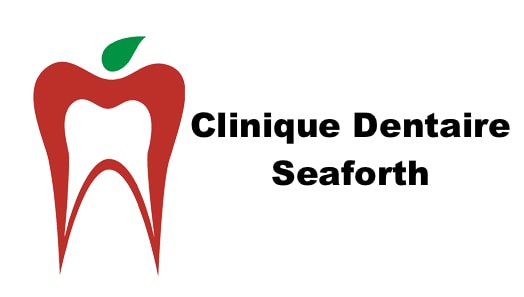Root Canal Treatment Montreal
Pain free root canal treatment
Root canals are a much-maligned dental procedure, but with a gentle, experienced dentist they need not be feared. A root canal is necessary when the pulp in the root of a tooth becomes diseased and dies. The pulp provides nutrients to the tooth and if the diseased pulp is not removed, it can cause an infection in the tooth and lead to the loss of the tooth. In a root canal, this diseased pulp is removed and the area around it is cleaned and sealed from further damage.
In most cases, after a root canal, a crown is placed over the tooth.
With today’s advancements in dental pain control techniques, in most cases root canals can be achieved entirely pain free.
Overview of a root canal
A root canal is a treatment to repair and save a badly damaged or infected tooth. The procedure involves removing the damaged area of the tooth (the pulp), cleaning and disinfecting it and then filling and sealing it. The common causes affecting the pulp are a cracked tooth, a deep cavity, repeated dental treatment to the tooth or trauma. The term “root canal” comes from cleaning of the canals inside the tooth’s root.
A root canal is necessary when the pulp in the root of a tooth becomes diseased and dies. The pulp provides nutrients to the tooth and if the diseased pulp is not removed, it can cause an infection in the tooth and lead to the loss of the tooth.
What to expect during a root canal treatment
There are a number of steps that will occur over a few visits to the clinic.
- X-ray – if a dentist suspects you may need a root canal, he will first take X-rays or examine existing X-rays to show where the decay is located.
- Anesthesia – local anesthesia is administered to the affected tooth. Again, Contrary to popular belief, a root canal is no more painful than a filling.
- Pulpectomy – an opening is made and the diseased tooth pulp is removed.
- Filling – the roots that have been opened (to get rid of the disease pulp) are filled with gutta-percha material and sealed off with cement.
Root canal illustration:
A Deep Infection
Root canal treatment is needed when an injury or a large cavity damages the tooth’s root. The root becomes infected or inflamed.
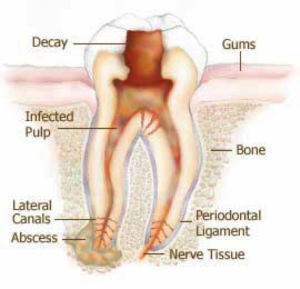
Diagram of infected pulp in a tooth requiring a root canal.
A Route to the Root
The dentist numbs the tooth. An opening is made through the crown of the tooth to the pulp chamber.

An diagram of the opening of a root canal.
Removing the Infected/Inflamed Tissue
Special files are used to clean the infection and unhealthy pulp out of the canals. Then they shape the canals for the filling material. Irrigation is used to help clean the canals and remove debris.
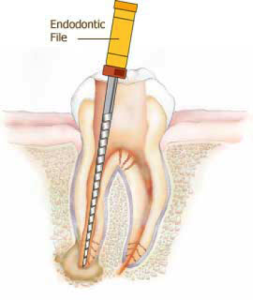
Removing the infected and inflamed tissue of a tooth through a root canal.
Filling the Canals
The canals are filled with a permanent material. Typically this is done with a material known as gutta-percha. This helps to keep the canals free of infection or contamination.
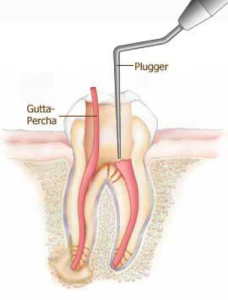
A root canal treatment with a plugger and Gutta Percha for infection free treatment.
Rebuilding the Tooth
A temporary filling material is placed on top of the gutta-percha to seal the opening. The filling remains until the tooth receives a permanent filling or a crown. A crown, sometimes called a cap, looks like a natural tooth. It is placed over the top of the tooth.
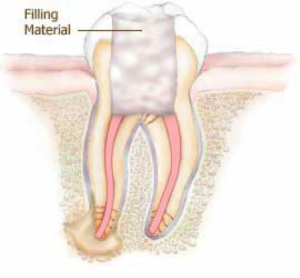
A root canal treatment with filing material showing.
Extra Support
In some cases, a post is placed into the root next to the gutta-percha. This gives the crown more support.
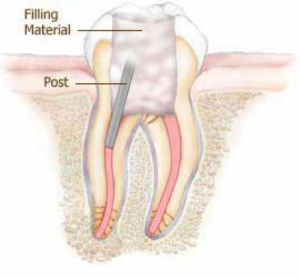
Root canal with a post inserted for added support.
The Crowning Touch
The crown is cemented into place.
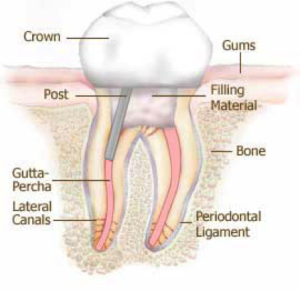
A complet root canal with crown added to the tooth.
For more information, contact us at our downtown dental clinic or call at 514-932-1110.
Tuesday
Wednesday
Thursday
Friday
Saturday
Sunday

